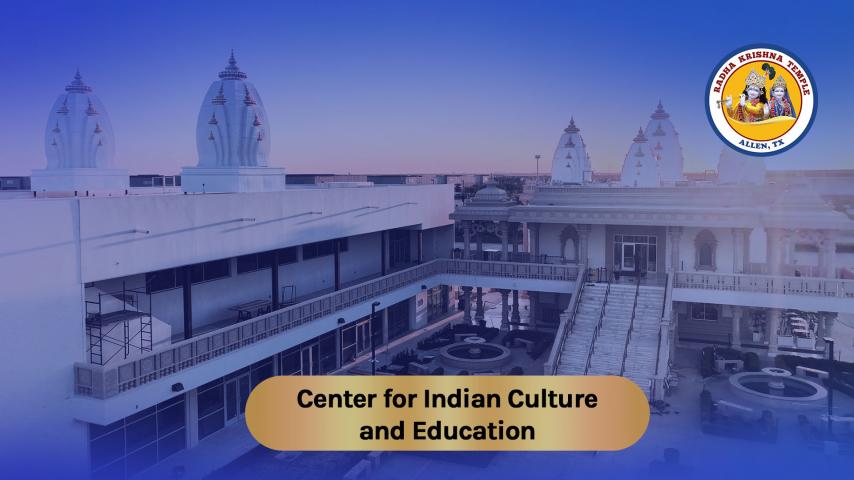
The historical and memorable inauguration of Phase 2 of the Radha Krishna Temple of Dallas, JKYog’s Center for Indian Culture and Education (CICE) was a grand success! Marked by beautiful poojas, ribbon-cutting, lots of dancing and singing, the highlights were the lovely underlying message in Swami Mukundananda’s talk and kirtans.
The significance of culture and education in our lives cannot be underestimated. Our cultural traditions provide richness and excellence to our existence in the form of beliefs, attitudes, and practices. Whether it is through the medium of education, fine arts, performing arts, crafts, gaming, or the way people practice religion and spirituality, a sub-culture represents the larger society upon which the practices are founded. Symbols of the Indian culture and education are reflected in the values upheld by citizens who attempt to preserve the most valued traditions regardless of the country in which they live.
The United States of America is a land of immigrants – a melting pot of diverse cultures, each of which establishes its footprint to influence generations of descendants across the country. The Indian diaspora is known to greatly value educational accomplishments and cultural practices as a way to transmit social values and minimize the cultural lag between generations. Grounded in aesthetic and spiritual beliefs and traditions, the Indian culture comprises a rich social heritage which enables the diaspora to shape the type of impact on current and future generations.
Connection Between Culture and Education
Culture and education are so intricately connected that it may be challenging at best to determine which impacts the other more, and where one begins and the other ends. The process of delivering knowledge through formal and informal education has maximum impact when the content materials (e.g., stories, poems, life histories) and examples are drawn from one’s culture. This is possible only when educational institutions in general and societies in particular, acknowledge the rich social heritage of various cultures and ethnic groups. When an individual’s education and cultural heritage serves as a symbolic representation of the inherent potential to contribute to society, the relationship between the two is strengthened, leaving less scope for prejudice.
JKYog’s Center for Indian Culture and Education
Education is the process of transferring knowledge and values to new generations in any society. While learning per se occurs at an individual level, education represents collective knowledge of a larger society and is transmitted in a variety of formal and informal ways. JKYog’s Center for Indian Culture and Education (CICE) has been established with the purpose of educating current and future generations about our rich cultural heritage and to preserve the most valued aspects.
Thousands of people of all ages across the world are already taking advantage of scores of educational and cultural experiences and classes offered through CICE. With specific reference to children’s growth and development, the most popular and influential programs include the character-building curriculum called Bal-Mukund as well as classes in dance, music, yoga, coding, math, etc. Special activities for youth such as the Toastmaster’s club are every effective in preparing them for future leadership roles. There are numerous classes for adults which focus on building knowledge and devotion through a study of our Vedic scriptures, languages (e.g., Hindi, Sanskrit), spiritual activities, health webinars, etc. There is a comprehensive list of all JKYog classes categorized by days of the week as well as broad areas including Vedic Scriptures, Human Excellence, Meditation, Satsang, Yoga and Lifestyle, and other Devotional activities.
Center for Indian Culture and Education Inauguration Highlights
The 3-day inauguration was marked by many different activities including devotional Poojas, the sacred Radha Krishna Abhishek, and a lovely Cultural Program. Here are some beautiful glimpses of the various events on the first two days of the program.

The entire Prayer Hall was filled with devotees who relished every minute of the devotional poojas. The beautiful Abhishek of Radha-Krishna by Swamiji and other devotees and brining the Utsav deities into the Temple's courtyard while singing and dancing, made the entire event so memorable.
With all the excitement of the celebration, the culmination was just as exhilarating! When Swamiji cut the ribbon to mark the grant opening of the CICE building, everyone cheered with delight! The most exciting part was when so many Allen City officials including Mayor Ken Fulk, and event Yajmans joined Swamiji on the stage for the celebratory dance. Finally, the Indian classical dances were a sight for sore eyes! Steeped in our lovely cultural traditions, the performances were par excellence!

Swami Mukundananda’s Divine Discourses
The Indian culture is well known throughout the world for its artistic and literary contributions. From classical music with 126 different types of raagas, classical dance forms, and architectural wonder of Hindu temples, to the remarkable literature and scientific accomplishments of Nobel laureates, India’s social heritage is beyond compare. Many ancient practices like yoga and Ayurveda are becoming increasingly popular even in the western world for their holistic approach. However, the maximum impact in the preservation of cultural traditions and practices has been through dissemination of divine knowledge from our sacred scriptures.
The Indian culture is characterized by spirituality. Spiritual elevation is considered to be the highest achievement in life and spiritual personalities are immensely revered by all people. In fact, the spiritual culture is what makes us all human. All other mechanistic worldly activities like eating, sleeping, procreating and protecting are performed even by animals. As human beings, our lives need to be purposed for a higher goal in life – to connect with our scriptural knowledge to achieve the ultimate purpose of life. The Indian temples serve this purpose as they constitute the nucleus of a society. Devotees who visit temples, feel energized, elevated in spirit, connected with their spiritual roots, and thus, practice devotion as an integral part of daily life.

It was in this context that Swamiji presented brief histories from the lives of three Bhakti Saints in his discourses during the 3-day inauguration program. These included Shree Haridas, Ravidas, and Soordas, whose immense positive influence on the Indian culture has been very remarkable. Their teachings are ingrained in the cultural tradition through their devotional compositions, the practice of simple living and high thinking, and embodiment of sacrifice and selflessness.
Embedded with sweet kirtans, Swamiji’s discourse was filled with inspiration and valuable knowledge.


